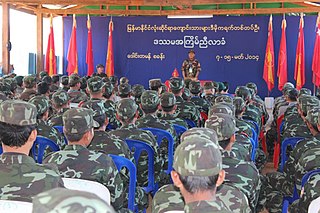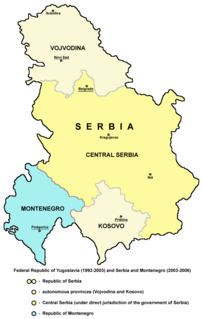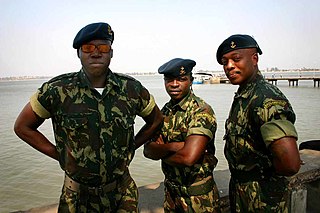
CITES is a multilateral treaty to protect endangered plants and animals. It was drafted as a result of a resolution adopted in 1963 at a meeting of members of the International Union for Conservation of Nature (IUCN). The convention was opened for signature in 1973 and CITES entered into force on 1 July 1975. Its aim is to ensure that international trade in specimens of wild animals and plants does not threaten the survival of the species in the wild, and it accords varying degrees of protection to more than 35,000 species of animals and plants. In order to ensure that the General Agreement on Tariffs and Trade (GATT) was not violated, the Secretariat of GATT was consulted during the drafting process.

The World Customs Organization (WCO) is an intergovernmental organization headquartered in Brussels, Belgium. The WCO is noted for its work in areas covering the development of international conventions, instruments, and tools on topics such as commodity classification, valuation, rules of origin, collection of customs revenue, supply chain security, international trade facilitation, customs enforcement activities, combating counterfeiting in support of Intellectual Property Rights (IPR), drugs enforcement, illegal weapons trading, integrity promotion, and delivering sustainable capacity building to assist with customs reforms and modernization. The WCO maintains the international Harmonized System (HS) goods nomenclature, and administers the technical aspects of the World Trade Organization (WTO) Agreements on Customs Valuation and Rules of Origin.

The Zimbabwe African People's Union (ZAPU) is a Zimbabwean socialist political party. It is a militant organization and political party that campaigned for majority rule in Rhodesia, from its founding in 1961 until 1980. In 1987, it merged with the Zimbabwe African National Union-Patriotic Front. It was relaunched in 2008.
The National Constitutional Assembly was a non-governmental organisation formed in 1997 as a grouping of individual Zimbabwean citizens and civic organisations including, labour movements, student and youth groups, women groups, churches, business groups and human rights organisations. It is led by chairperson Lovemore Madhuku, and other important staff includes programmes coordinator Patience Nhliziyo. The organisation has historically been closely allied to the Movement for Democratic Change, but in 2013, became a political party of its own after rejecting the constitution written by the Government of National unity between MDC-T and ZANU - PF.
The Israeli–Lebanese Ceasefire Understanding was an informal written agreement between Israel and Hezbollah, reached through the diplomatic efforts of the US, which ended the 1996 military conflict between the two sides. The agreement was announced at 18:00 on April 26, 1996.

Nelson Chamisa is a Zimbabwean politician and former church pastor, current MDC Alliance President and former member of the House of Assembly of Zimbabwe for Kuwadzana, Harare. He became the Secretary for Information and Publicity for the opposition party Movement for Democratic Change (MDC), and former national youth chairperson for that party. Chamisa was the MDC Alliance's candidate for president in the 2018 general election.
The North–South Centre, officially the European Centre for Global Interdependence and Solidarity, is a Partial Agreement — of the Council of Europe, the oldest political organisation of European states.
Daniel Kuzozvirava Shumba is a former Zimbabwe Army colonel and businessman; he came back into active politics and rose to Masvingo Provincial Chairman and member of the Central Committee [(the highest organ)] of the ZANU-PF political party. He is a son of a founding member of ZANU, and had a strong political background. He underwent Zanla's basic military training at Chisamba, Zambia, in 1978 before continuing with his academics. Shumba's accolades extend to having served in the Special Forces of the Zimbabwe National Army from 1983 to 1989. He established himself as a fearless fighter.

The All Burma Students' Democratic Front is an opposition group in Myanmar. It was founded on 1 November 1988, after the 8888 protests in Yangon. The group's leadership consists mostly of former student exiles.

Zimbabwe Electoral Commission (ZEC) is a nominally independent organisation which controls elections at all levels of Zimbabwe politics. It was established by an Act of the Parliament in 2004, with influence from its predecessor, the Electoral Supervisory Commission as well as the Southern African Development Community.
Priscilla Misihairabwi-Mushonga is a Zimbabwean politician and a former member of the House of Assembly for Glen Norah, Harare. During her time as Glen Norah's MP, she also served as the shadow foreign minister for the Movement for Democratic Change. When the party split in 2005, she remained with the MDC formation and was elected Deputy Secretary-General of that party. She has been representing her party in the Zimbabwean political negotiations.
The Scottish Human Rights Commission (SHRC) is the national human rights institution for Scotland. It was established by an Act of the Scottish Parliament and started its work in 2008. The Commission is independent of Government, and of the Scottish and Westminster Parliaments. It seeks to promote and protect the human rights of everyone in Scotland, working to increase awareness, recognition and respect for human rights, and make them more relevant and easier to apply in everyday life. The Commission aims to help everyone understand their rights and the shared responsibilities everyone has to each other and to their community.

United Nations Security Council resolution 787, adopted on 16 November 1992, after reaffirming Resolution 713 (1991) and all subsequent resolutions on the topic, the Council called upon the parties in Bosnia and Herzegovina to consider the draft outline constitution as a basis for negotiating a political settlement of the conflict in the country, and went on to impose further international sanctions on the Federal Republic of Yugoslavia.

United Nations Security Council resolution 818, adopted unanimously on 14 April 1993, after reaffirming resolutions 782 (1992) and 797 (1992) on the situation in Mozambique, the Council stressed its concern regarding the delays and difficulties affecting the implementation of the peace process envisaged in the Rome General Peace Accords during the Mozambican Civil War.

United Nations Security Council resolution 856, adopted unanimously on 10 August 1993, after reaffirming Resolution 813 (1993) and welcoming a peace agreement signed, under the auspices of the Economic Community of West African States (ECOWAS), between the Interim Government of National Unity of Liberia (IGNU), the National Patriotic Front of Liberia (NPFL), and the United Liberation Movement for Democracy (ULIMO), the Council approved a dispatch of 30 military observers to Liberia.

United Nations Security Council resolution 863, adopted unanimously on 13 September 1993, after reaffirming resolutions 782 (1992), 797 (1992), 818 (1993) and 850 (1993) on the situation in Mozambique, the Council discussed the implementation of the Rome General Peace Accords.

United Nations Security Council resolution 866, adopted unanimously on 22 September 1993, after reaffirming resolutions 813 (1993) and 856 (1993), the Council noted that United Nations involvement would contribute significantly to the effective implementation of the Peace Agreement in Liberia and went on to establish the United Nations Observer Mission in Liberia (UNOMIL).

United Nations Security Council resolution 937, adopted on 21 July 1994, after reaffirming resolutions 849 (1993), 854 (1993), 858 (1993), 876 (1993), 881 (1993), 892 (1993), 896 (1994), 901 (1994), 906 (1994) and 934 (1994), the Council expanded the United Nations Observer Mission in Georgia (UNOMIG) to include co-operation with the Commonwealth of Independent States (CIS) and extended its mandate until 13 January 1995.

United Nations Security Council resolution 1551, adopted unanimously on 9 July 2004, after recalling previous resolutions on the conflicts in the former Yugoslavia, including resolutions 1031 (1995), 1088 (1996), 1423 (2002) and 1491 (2003), the Council extended the mandate of the Stabilisation Force (SFOR) in Bosnia and Herzegovina for a further period of six months and welcomed the deployment of EUFOR Althea at the end of the SFOR's mandate.

The Algerian Space Agency, (ASAL) was established on January 16, 2002 in Bouzareah, Algiers. It is in charge of the Algerian space program. ASAL has flown five different satellites.















